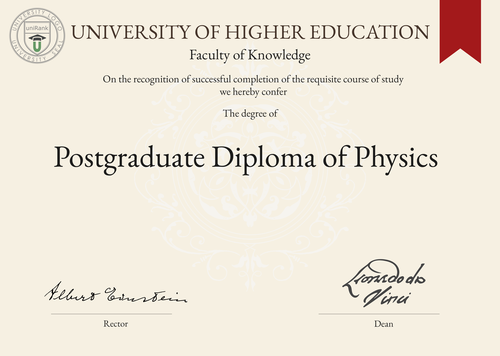
Postgraduate Diploma of Physics (PGDip Physics)
Guide to Postgraduate Diploma of Physics Program/Course/Degree
Postgraduate Diploma of Physics (PGDip Physics)

Program Name:
Postgraduate Diploma of PhysicsProgram or Degree abbreviation:
PGDip PhysicsDuration range:
The duration of the program typically ranges from 1 to 2 years, depending on the university and country.Tuition range:
Tuition fees for the program can vary significantly depending on the chosen country and university. It is recommended to check with specific institutions for accurate information.Overview:
The Postgraduate Diploma of Physics is a comprehensive program designed to provide students with advanced knowledge and skills in the field of physics. It offers a deeper understanding of various theoretical and practical aspects of physics, preparing students for further research or professional opportunities.Curriculum Overview by year:
The curriculum of the program is structured to cover a wide range of topics in physics. The specific courses and their order may vary depending on the university, but typically include subjects such as Quantum Mechanics, Electromagnetism, Statistical Mechanics, Solid State Physics and Astrophysics.Key Components:
The key components of the program include theoretical and practical coursework, laboratory experiments, research projects and seminars. Students are encouraged to develop critical thinking, problem-solving and analytical skills through hands-on experience and independent study.Career Prospects:
Graduates of the Postgraduate Diploma of Physics program have various career prospects. They can pursue research positions in academia, government laboratories, or private industries. Additionally, they can work in fields such as engineering, technology, finance, data analysis and education.Salary Expectations:
Salary expectations for individuals with a Postgraduate Diploma of Physics can vary depending on factors such as location, industry and level of experience. Generally, physics graduates have the potential to earn competitive salaries, especially in specialized fields. For a more accurate understanding of salary expectations, you can utilize the Job Sites Search Engine, from our sister site jobRank, which searches over 4,600 job sites worldwide. Make sure to specify not only the job title but also the country you are interested in.Conclusions:
It is important to note that the duration, tuition fees, curriculum, key components, career prospects and salary expectations of the Postgraduate Diploma of Physics program can vary depending on the chosen country or location of study, as well as the specific university. Prospective students are advised to research and compare different institutions to find the best fit for their academic and career goals. Visitors interested in pursuing a Postgraduate Diploma of Physics can search for universities offering this degree worldwide through the uniRank World Universities Search Engine. This tool provides a comprehensive database of universities and their programs, allowing individuals to explore options and make informed decisions about their education.World Universities Search Engine
search for Postgraduate Diploma of Physics (PGDip Physics) and add the Location (country, state etc.) or specific University you are interested in studying at.
Query examples:
- Postgraduate Diploma of Physics (PGDip Physics) United States
- Postgraduate Diploma of Physics (PGDip Physics) United Kingdom online
- Postgraduate Diploma of Physics (PGDip Physics) Australia international students
- Postgraduate Diploma of Physics (PGDip Physics) University of California
- Postgraduate Diploma of Physics (PGDip Physics) University of London tuition fees
- Postgraduate Diploma of Physics (PGDip Physics) University of Sydney scholarships
Share Program/Course
Interesting? Share this program/course/degree info with your friends now.